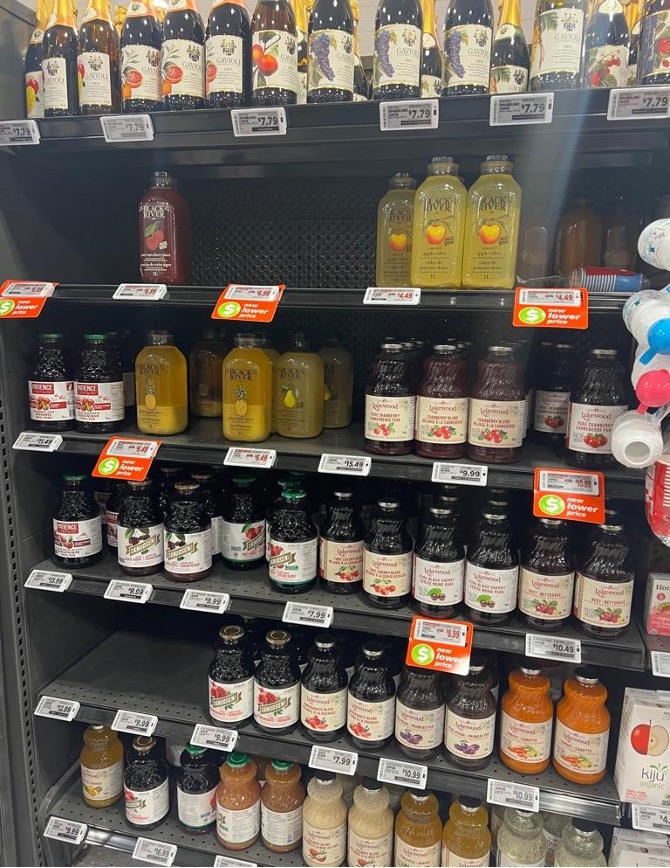
Listen to the full story here:
Marketed on TikTok as a sleep solution, the recipe for the “sleepy girl mocktail” bears a striking resemblance to older and sometimes fatal concoctions that first became popular in the 1960s.
The sleepy girl mocktail includes clear soda, magnesium powder and cherry juice, while an older version called Lean includes the same sweet soda mixture plus cough syrup. Lean was also described as a sleep aid, but was also known as purple drank and Sizzrup. Some variations on the recipe include the addition of codeine, which can be addictive and dangerous.
TikTok users are posting about their variations on the recipes, some closer to the original and including codeine, and some closer to the Sleepy Girl Mocktail.
One user’s video of her making lean — calling it the sleepy girl mocktail — reached 1.6 million views in just five days, with 208,900 likes, 15,700 saves and 9,939 shares by other TikTok users. Some comments under the user’s video mention her making “gentrified lean,” others tagging their friends and some making recommendations for the lean recipe.
How could these recipes affect my body?
A.T., a University of Guelph-Humber student, has taken lean in the past, finding the effects on their body alarming.
“I felt tired,” they said. “My chest felt super heavy and I was slumping to the side afterwards.”
A.T. mentioned they had a hard time even remembering any events of their day after drinking lean, needing friends to fill them in.
Lean’s effects on the body can include drowsiness, relaxation, out-of-body sensations and feelings of euphoria, said to last up to six hours. It’s also highly addictive and may be fatal.
Lean’s recipe contains codeine, a type of opioid. Accidental apparent opioid toxicity deaths in Ontario were 16.9 people per 100,000 in the first half of 2023, according to the Public Health Agency of Canada.
The effects of lean may depend on the person; but for A.T., they felt terrible.
“My eyes turned yellow and my blood vessels were visible. I had trouble walking and trouble controlling my thoughts and speech. The next day, I felt really groggy and terrible.”
A.T. has not used the drug since 2019 but finds the trend of the “lean” sleepy girl mocktail nonsensical.
“I don’t worry about my siblings, specifically, because they’re educated on the dangers of this drug, but I do worry about children and teens that have access to this content,” A.T. says. “To me, it makes no sense why someone would do this for a trend.”
Does the Real “Sleepy Girl Mocktail” Work and Is It Safe? What Are Alternatives?
Elizabeth Manafò, a lecturer at Toronto Metropolitan University and a dietitian, says to focus on good habits. “Being physically active and focusing on improvements to your sleep hygiene are better bets.”
Manafò says that cherries in general are rich in nutrients and good to eat. They include “antioxidants and minerals, including magnesium,” Manafò says, a supplement that many people are adding to their mocktails.
“Magnesium is connected with sleep regulation, including quality of sleep and duration,” Manafò says.
Despite this connection, Manafò says more research is needed to suggest “more magnesium means better sleep outcomes.”
The CDC suggests making your bedroom quiet, relaxing and “at a comfortable temperature,” in order to improve your sleep quality. Removing electronics and avoiding alcoholic beverages and caffeine before your bedtime can aid in sleep quality as well. Warm milk, chamomile tea and melatonin supplements can also help you fall asleep, according to Johns Hopkins Medicine.
Be Wary of Misinformation Online & Protect Yourself
Lindsay Williams, a counsellor for an opiate support team at a Toronto clinic, does say she has not seen the people she’s worked with be influenced by trends, such as the sleepy girl mocktail.
Lauren Clegg, a manager for Research and Centres of Innovation Communications, sent a list of the Centre for Addiction & Mental Health’s (CAMH) information regarding certain drugs, including opiates, that the public can access.
CAMH recommends keeping a naloxone kit if you or someone you know uses opioids, like codeine. “Naloxone is a medication that can temporarily reverse the effects of an opioid overdose and allow time for medical help to arrive.”
Manafò says it is difficult to stay on top of all the “nutrition mis and disinformation online.”
“Most claims may be based on a small amount of truth that is taken out of context.”
For the everyday person, experts like Manafò say it is important to be vigilant online and always speak to your family doctor before adding supplements to your diet.
“Most healthy adults do not need to rely on supplements to meet their nutritional goals,” Manafò says.
“Be careful of who you listen to on social media and exercise an abundance of caution.”
Reporter for On The Record, winter 2024. Fourth-year journalism student at Toronto Metropolitan University.

